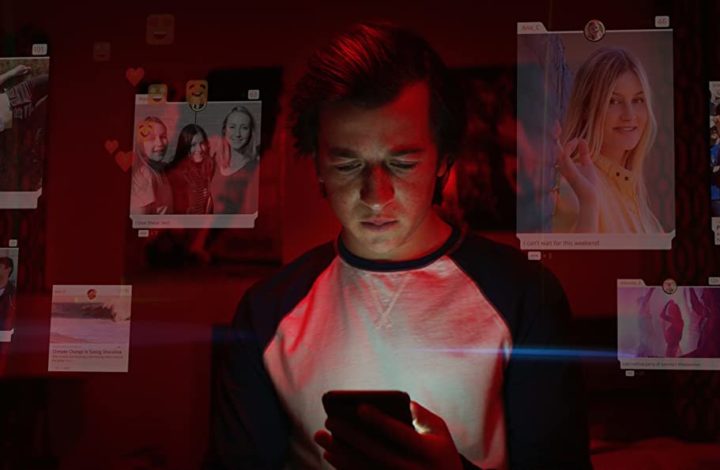
MPAA Rating: PG-13 | Rating: ★★★
Release year: 2020
Genre: Documentary Director: Jeff Orlowski
The irony behind reviewing filmmaker Jeff Orlowski’s Netflix-distributed documentary The Social Dilemma is that you probably found this film review through social media. Perhaps it was due to the Rotten Tomatoes aggregate, or maybe through Twitter or Facebook; in any case, you’re almost certainly reading these very words in a web browser on your phone or tablet. It’s the world we live in, a technology-driven culture of immediacy. The Social Dilemma aims to pull back the curtain and allow us to see the tech developers and A.I. pulling the strings. Or, perhaps a better metaphor for the film’s agenda (one which has been tragically co-opted by alt-right wackiness) is to offer viewers the “red pill” and see the world of social media for what it is: a real-life dystopian Matrix.
The Social Dilemma utilizes conventional talking head documentary interviews warning us about the unethical premises behind social media platforms, interspersed with a mildly cheesy illustrative drama featuring a family’s personal struggles with social media. As teenage Ben (Skyler Gisondo) is increasingly manipulated by the anthropomorphized A.I. algorithms (played by Mad Men‘s Vincent Kartheiser), we watch him slowly transform from a happy high schooler into a self-isolated political extremist while his anti-social media sister (Kara Hayward) helplessly looks on. Beneath it all is an anxiety-inducing electronic-synth score which seems to be intentionally mimicking Trent Reznor and Atticus Ross’s Oscar-winning score for The Social Network. All of these elements give the film a bit of an after-school special vibe, a preachy tone of prophetic warning—take heed, lest ye go astray by following Facebook algorithms and Russian bot accounts, and thus become a QAnon flat-earther. What is so unsettling is that despite the didacticism, we should pay attention to the message because this kind of thing is actually happening. We all are watching friends and family members uncritically share memeable outlandish theories or falsehoods couched in political outrage, the most recent being (ironically) the Cuties controversy and the call to “cancel” Netflix despite Cuties‘s own strong message about the dangers of social media for young teens (in fact, The Social Dilemma and Cuties would make for a very interesting double feature).
Many of the interviewees in The Social Dilemma are Silicon Valley insiders, former bigwigs at Google, Facebook, Twitter, Instagram, Pinterest, YouTube, etc. As they share how Facebook algorithms work and the monetization of social media accounts, the film becomes increasingly effective precisely because it feels so familiar. Yes, we’ve seen an increase in polarization across political lines in recent years. Yes, we’ve seen an increase in fake news, conspiracy theories, and sheer idiocy in our social media feeds. Yes, we’ve seen a quantitative increase in teen anxiety, online bullying, and suicide over the past decade. The Social Dilemma offers a partial explanation as to why we’ve seen this phenomenon. Even as it doesn’t necessarily offer groundbreaking new insights, it does share about how the Internet and social media works in an effective and digestible way, which makes it useful for wider general audiences.
The film’s primary voice of concern is Center for Humane Technology co-founder Tristan Harris, a former Google design ethicist who has a degree from Stanford on the ethics of human persuasion. In other words, he is very well trained in how to convince you of something. And he does this rather effectively in The Social Dilemma, utilizing narratives, statistics, body posture, voice inflection, and simple-but-striking Tweet-sized analogies in order to effectively transmit the information to the viewer about how social media platforms are designed not for our individual good, but to use our attention span in order to generate revenue for the company through advertising. And while I appreciate, and even generally agree with, Harris’s perspective, by the end of the film I also found myself wondering if I was just being sold something, even if that “something’ is better than the alternative.
In one presentation, Harris points out that social media as a technology and tool has not played to our human strengths, but our human weaknesses—it often brings out the worst in us, and is intended to do so. With this observation, I was struck by the tacit theological underpinnings of The Social Dilemma: it makes a compelling case for the Christian doctrine of original sin, i.e., the inherent and inescapable fallibility of human beings. We can read Genesis 3 and ask ourselves, “why on earth did Adam and Eve listen to a talking snake and eat from the one tree they weren’t supposed to? What a silly story.” But then we cannot go even a single hour without checking our phones even when we know it’s not necessarily the best thing for us. And this is what is so disturbing about The Social Dilemma: it directly addresses our innate human frailties and inconsistencies regarding technology, reminding us of how weak-willed we truly are. Even when we know we are being manipulated—even when the tech creators openly tell us “we are using you to in order to make money for ourselves”—we will continue to use social media. There is both an urgency and a helplessness to the prophetic message of The Social Dilemma: we must change how social media functions, but we may not have the will power or attention span to do so.
IMDB Listing: https://www.imdb.com/title/tt11464826/
Leave a Reply